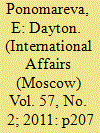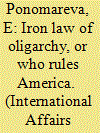| Srl | Item |
| 1 |
ID:
104281


|
|
|
|
|
| Publication |
2011.
|
| Summary/Abstract |
Dayton, Ohio, is home to a U.S. Air Force base and undoubtedly one of the symbols of the new world order. Alongside Brussels, The Hague, Strasbourg, and Rambouillet, it is associated with redealing out cards of History and reestablishing rules of the political game. You will recall that the General Framework Agreement for Peace in Bosnia and Herzegovina (Dayton Agreement) was initialed on November 21, 1995. The Agreement went into effect on December 14, 1995 after its signing in Paris. Its guarantors were the USA, UK, France, Germany, and Russia. The coming into force of this Agreement put an end to the armed confrontation in Bosnia and Herzegovina in 1992-1995; it separated the warring sides and set apart territories of the Republika Srpska and the Muslim-Croat Federation.
|
|
|
|
|
|
|
|
|
|
|
|
|
|
|
|
| 2 |
ID:
110091


|
|
|
|
|
| Publication |
2011.
|
| Summary/Abstract |
ROBERTO MICHELS (1876-1936), historian and sociologist highly valued in the West, not merely explained why the majority could not govern itself. He was a fascist sympathizer who joined the fascist party of Italy in 1928. Mussolini made him professor of economics and the history of doctrines at the University of Perujia where he helped organize a "fascist faculty" of political science to create "new political thinking" and "train professional fascist leaders." His works are part of the political science curricula while his Political Parties: A Sociological Study of the Oligarchical Tendencies of Modern Democracy written in 1911 contains the so-called "iron law of the oligarchical tendencies" better known as the "iron law of oligarchy." Its author argued that to be efficient democracy needed an organization of an "active minority" (the elite) since direct rule of large masses was technically impossible and kills democracy. "It is organization which gives birth to the domination of the elected over the electors... of the delegates over the delegators. Who says organization says oligarchy."1
|
|
|
|
|
|
|
|
|
|
|
|
|
|
|
|